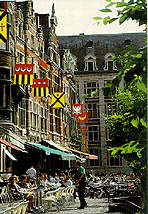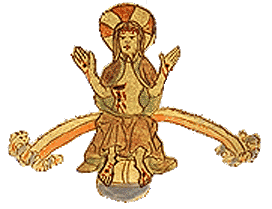Scans include material from:
(1) British Library Additional MS 35290 - The ‘York Register’ - the sole surviving script);
(2) British Library Additional MS 33852 - The Bakers' Book of Account;
(3) British Library Additional MS 25006 - The Lay Folks' Catechism;
(4) British Library MS Lansdowne 402 - The Register of the Corpus Christi Guild;
(5) British Library Additional MS 37049 - a miscellany of religious and meditative
pieces
written by a Carthusian in Yorkshire in the mid 15th century.
..... |
Technical.
The early months of the Project were spent setting up a reliable FTP system from the British Library via ULCC, investigating different types of file transportation and backup, and in installing and learning to use a CD-ROM writer provided by a grant from the University College of St Martin. We also honed our skills in Multimedia Toolbook 3 for conference presentations at home and abroad. The Project Officer also worked, under supervision, with the British Library’s electronic camera, and the Project Directors have developed their skills and are gaining some theoretical background in computer imaging techniques. He also investigated procedures and software for writing SGML.
Visits:
The Project Team visited the British Library Lending Division at Boston Spa, to discuss the SGML cataloguing of manuscript material with Richard Masters, and were shown the DTD he is developing with Andrew Prescott for the description of illuminated manuscripts in the British Library, which we are using as a basis for our DTDs.
The Team compiled a detailed shooting list of desiderata, image by image, with a brief description of the content of each page. The evaluation and listing of potential material for the archive naturally included a number of visits to York archives, and to other libraries with relevant manuscript material, notably the Bodleian Library and Glasgow University Library. This led to several new avenues for research, most particularly the provenance and relevance of York Minster Library Additional Ms 2, the so-called Bolton Hours, the number and nature of alien merchants living in York at the time of the plays, and of York mercantile activity across the North Sea, and the hands of the different York civic scribes.
 The Directors also visited the Katholieke Universiteit, Leuven, in order to research on the mercantile
and other connections between York and the Low Countries in the later Middle Ages.
It was decided to apply for grants to pursue this further. While there, they visited
the major trading centres mentioned in the records: Antwerp, Bruges, Middelburg, Veere,
and Bergen-op-Zoom.
The Directors also visited the Katholieke Universiteit, Leuven, in order to research on the mercantile
and other connections between York and the Low Countries in the later Middle Ages.
It was decided to apply for grants to pursue this further. While there, they visited
the major trading centres mentioned in the records: Antwerp, Bruges, Middelburg, Veere,
and Bergen-op-Zoom.
The Coventry Facsimile.
A germane project provided the Project with a trial run on archival scanning in sites other than the British Library. A team from the Library and the Project visited the Coventry Record Office to scan the manuscripts of the Weavers' Play and relevant guild material for an electronic facsimile edition being produced by Professor King. This will be supplemented with material from the British Library's manuscript and printed holdings.
Project Associate.
Mrs Olga Horner joined the team as Project Associate, assisting in the search for and description of sources, particularly in the Public Record Office.
Publications:
The Project Team published the following articles:
Pamela M. King and Meg Twycross, ‘After REED?: The York Doomsday Project’ Medieval English Theatre 17 (1995) 132-148;
Meg Twycross, ‘The York Mercers’ Lewent Brede and the Hanseatic Trade’ Medieval English Theatre 17 (1995) 96-119.
An account of the Project also appeared in the British Library's Initiatives for Access Autumn 1996 Newsletter.
Conference papers:
Members of the Team gave papers on aspects of the Project's work at the following conferences:
Pamela M. King, ‘The Bolton Hours and the York Plays’ (31st International Congress on Medieval Studies, Kalamazoo, 9-12 May 1996);
Meg Twycross, ‘The York Doomsday Project 1995-1996’ (multimedia presentation; 31st International Congress on Medieval Studies, Kalamazoo, 9-12 May 1996);
Pamela M. King, ‘The York Doomsday Project 1995-1996’ (multimedia presentation; ALLC - ACH, Bergen, Norway, 25-29 June 1996);
Meg Twycross, Paul Williams, Joanne Lomax, ‘The York Doomsday Project’ (multimedia presentations, DRH96: Digital Resources for the Humanities, Oxford, 1-3 July 1996);
Meg Twycross, ‘Aliens in York in the Fourteenth and Fifteenth Centuries’ (International Medieval Congress, Leeds, 8-11 July 1996);
Meg Twycross, ‘The Use of Computers in Teaching and Learning Palaeography’
(University of Leeds Graduate Medieval Congress, 15-16 July 1996). |

 The Directors also visited the Katholieke Universiteit, Leuven, in order to research on the mercantile
and other connections between York and the Low Countries in the later Middle Ages.
It was decided to apply for grants to pursue this further. While there, they visited
the major trading centres mentioned in the records: Antwerp, Bruges, Middelburg, Veere,
and
The Directors also visited the Katholieke Universiteit, Leuven, in order to research on the mercantile
and other connections between York and the Low Countries in the later Middle Ages.
It was decided to apply for grants to pursue this further. While there, they visited
the major trading centres mentioned in the records: Antwerp, Bruges, Middelburg, Veere,
and